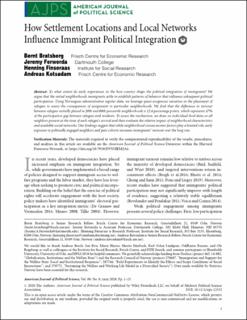How Settlement Locations and Local Networks Influence Immigrant Political Integration
Peer reviewed, Journal article
Published version
Permanent lenke
https://hdl.handle.net/11250/2732268Utgivelsesdato
2020Metadata
Vis full innførselSamlinger
- Publikasjoner fra CRIStin [716]
- Tidsskriftpublikasjon [389]
Originalversjon
10.1111/ajps.12532Sammendrag
To what extent do early experiences in the host country shape the political integration of immigrants? We argue that the initial neighborhoods immigrants settle in establish patterns of behavior that influence subsequent political participation. Using Norwegian administrative register data, we leverage quasi‐exogenous variation in the placement of refugees to assess the consequences of assignment to particular neighborhoods. We find that the difference in turnout between refugees initially placed in 20th and 80th percentile neighborhoods is 12.6 percentage points, which represents 47% of the participation gap between refugees and residents. To assess the mechanism, we draw on individual‐level data on all neighbors present at the time of each refugee's arrival and then evaluate the relative impact of neighborhood characteristics and available social networks. Our findings suggest that while neighborhood socioeconomic factors play a limited role, early exposure to politically engaged neighbors and peer cohorts increases immigrants' turnout over the long run.
